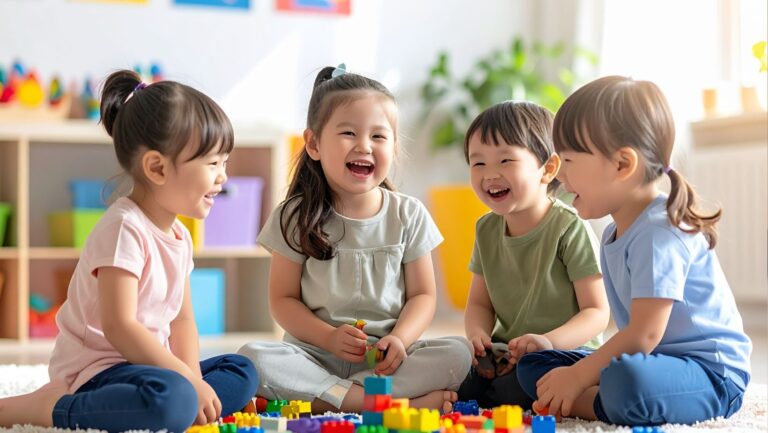Table of Contents
ToggleUnderstanding mental health isn’t just for adults in stuffy offices. Kids deserve to know what it means too! Think of mental health as the invisible backpack everyone carries. Some days it’s light and easy to haul around, while other days it feels like it’s packed with rocks.
Understanding Mental Health
Mental health is crucial for kids, playing a significant role in their overall development. Understanding mental health helps children navigate their emotional and social worlds effectively.
Importance of Mental Health for Kids
Mental health influences how kids think, feel, and act. Positive mental health fosters resilience, enabling children to cope with stress and challenges. Strong mental well-being supports academic success and enhances relationships with peers. Kids who prioritize mental health are more likely to develop healthy coping strategies. Engaging in open discussions about feelings encourages emotional intelligence and empathy. Schools can benefit from an emphasis on mental health, improving classroom environments and reducing bullying.
Common Misconceptions
People often misunderstand mental health regarding children. Many believe kids are too young to experience mental health issues, which isn’t true. Emotional struggles can affect children as early as preschool. Additionally, some think mental health problems are a sign of weakness; in fact, they are health conditions that require attention. Parents sometimes avoid discussing mental health, fearing stigma. Open conversations help reduce misconceptions and foster support networks. Recognizing mental health as an important aspect of well-being promotes a healthier, happier childhood.
Mental Health Definition for Kids
Mental health is about how children think, feel, and act. Kids experience emotions, just like adults, and understanding mental health is essential for their growth.
Simple Explanation
Mental health refers to the emotional and psychological well-being of children. It involves recognizing and managing feelings, developing coping skills, and building resilience. Healthy mental health helps kids handle stress and connect with others. Just as physical health affects the body, mental health impacts a child’s daily life and interactions. Teaching kids about mental health promotes self-awareness and emotional regulation.
Key Components
Several key components shape mental health in children. Emotional awareness plays a vital role, enabling kids to identify and express their feelings. Social skills are equally important, as they help children build relationships with peers. Coping strategies provide tools for managing stress, while support systems, such as family and friends, foster a sense of belonging. Together, these elements contribute to overall mental well-being, equipping children to navigate challenges effectively.
Signs of Mental Health Issues in Children
Recognizing mental health issues in children is crucial for timely support. Parents, caregivers, and educators should pay attention to various signs.
Emotional Symptoms
Emotional symptoms often manifest as excessive anger, sadness, or anxiety. Children may struggle to manage their feelings during everyday situations. Frequent mood swings might indicate underlying issues. It’s common for kids to express feelings of worthlessness or hopelessness. Withdrawal from activities they once enjoyed can also signal distress. Changes in sleep or appetite can further reflect emotional struggles. Children may express their discomfort through complaints about physical ailments, like headaches or stomachaches, as well. Early identification of these emotional signs can lead to effective interventions.
Behavioral Symptoms
Behavioral symptoms frequently include drastic changes in a child’s behavior. Some kids may act out more often, leading to unexpected aggression or defiance. A decline in academic performance often accompanies these behavioral shifts. Social withdrawal from friends and classmates can signal deeper issues. Consistent difficulty in following rules or routines may indicate challenges in coping. Regressive behaviors, such as bedwetting or thumb-sucking, may emerge as well. Frequent tantrums or meltdowns can highlight emotional struggles. Observing these behavioral changes can help caregivers seek appropriate support and guidance for the child.
Promoting Positive Mental Health in Kids
Promoting positive mental health in children involves equipping them with tools and techniques that foster resilience and emotional well-being.
Healthy Coping Strategies
Healthy coping strategies empower children to manage stress and emotions. Encouraging activities like physical exercise, drawing, and journaling helps kids express their feelings. These actions not only provide an outlet but also build emotional resilience. Practicing mindfulness techniques, such as deep breathing and meditation, teaches children to calm their minds during overwhelming moments. Example strategies also include problem-solving skills that enable kids to confront challenges effectively. Regularly talking about these strategies reinforces their importance, making kids feel more equipped to cope with life’s ups and downs.
Encouraging Open Communication
Encouraging open communication about feelings is essential for children’s mental health. Providing a safe space allows kids to share their thoughts without fear of judgment. Parents and caregivers benefit from actively listening and validating children’s feelings, ensuring they feel heard. Discussing emotions regularly helps children recognize their feelings and develop vocabulary to express themselves. Utilizing prompts or games that encourage sharing can also foster conversations. Consistent communication not only strengthens relationships but also builds trust, paving the way for children to seek support when facing difficulties.
Resources for Parents and Caregivers
Accessing the right resources can greatly support children’s mental health. Parents and caregivers can find valuable information and tools to help their children thrive.
Books and Articles
Numerous books and articles focus on children’s mental health. Titles like “The Whole-Brain Child” by Daniel J. Siegel and Tina Payne Bryson offer insights into child brain development and emotional regulation. Other helpful reads include “What to Do When You’re Scared and Worried” by James J. Crist, which addresses anxiety in kids. Articles from reputable sources such as the American Academy of Pediatrics provide practical advice on managing stress and fostering resilience. Parents should encourage kids to explore age-appropriate literature, boosting emotional intelligence and understanding.
Professional Help
Engaging with professionals can enhance children’s mental health. Pediatricians often provide valuable guidance, helping identify mental health needs early. Therapists specializing in child psychology offer coping strategies tailored for young minds. Local mental health clinics frequently host workshops and support groups for families. Utilizing resources like school counselors can also pave the way for addressing emotional challenges. Parents are encouraged to seek tailored support when they notice concerning signs in their children’s behavior or emotions.
Conclusion
Understanding mental health is essential for children’s growth and well-being. By recognizing its significance and fostering open discussions about emotions, caregivers can help children develop resilience and coping skills. This proactive approach not only supports healthier childhoods but also enhances relationships and academic success.
Equipping kids with tools to manage their feelings empowers them to navigate life’s challenges effectively. With the right resources and support systems in place, children can thrive emotionally and socially. Prioritizing mental health lays the foundation for a brighter future, ensuring kids feel valued and understood as they grow.





